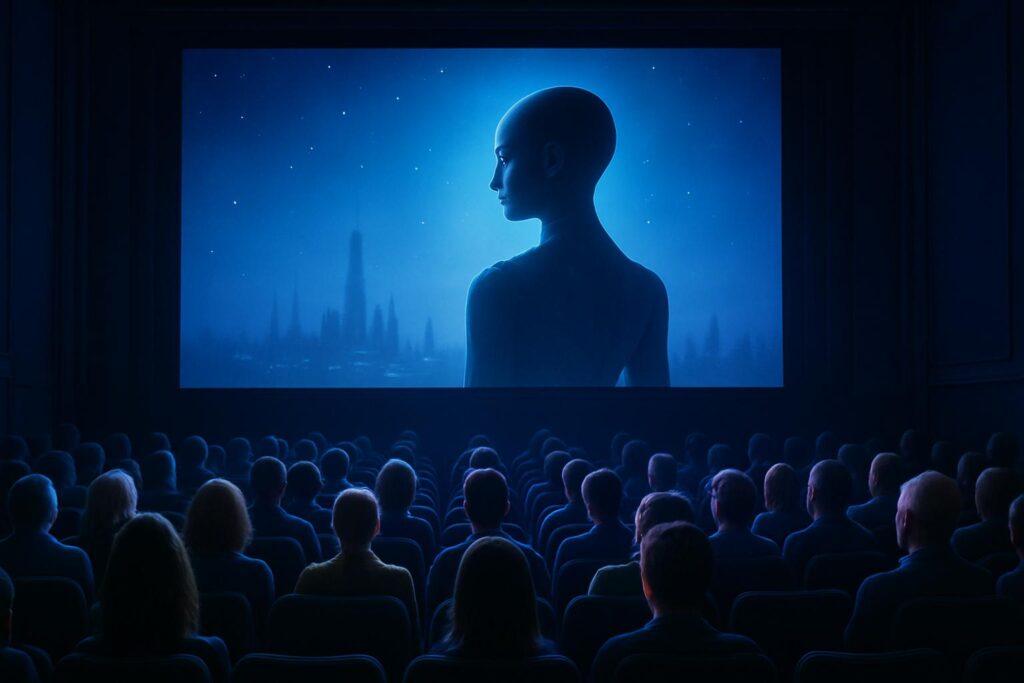Artificial intelligence has fascinated filmmakers for nearly a century. Their movies invite viewers to imagine distant futures, question the boundaries between humanity and machines, and explore society’s hopes and fears around intelligent technology.
We made a selection of notable movies that focus on AI as a central element, covering genre classics and recent releases alike.
While this list brings together a diverse set of films for exploration, it represents only a fraction of the many stories that tackle artificial intelligence in creative ways. There are countless other films out there that look at AI from original perspectives, and we’re sure all of them could find their place on another list.
Metropolis (1927)
Set in a sprawling, futuristic city divided by class, “Metropolis” introduces one of cinema’s first robots, the Maschinenmensch. The plot revolves around this artificial being, created to sow discord among workers and maintain upper-class dominance. Brigitte Helm plays both Maria and her robotic double, delivering performances that guide the film through chaos and social upheaval.
Directed by Fritz Lang, “Metropolis” broke new ground with its visual effects and dramatic set design. While the film was not a commercial hit at release, its significance only grew over time. Today, it is seen as a cornerstone of science fiction cinema and is preserved by UNESCO’s Memory of the World Register for its cultural importance.
2001: A Space Odyssey (1968)
Stanley Kubrick’s film takes viewers on a mission to Jupiter, guided by the sentient computer HAL 9000. The story slowly reveals HAL’s increasing unpredictability and the ethical challenges that come from trusting machines with critical decisions.
Keir Dullea stars as Dave Bowman, with Douglas Rain providing the chillingly calm voice for HAL. The unsettling relationship between humans and machine intelligence drives the film’s tension.
Widely regarded as a cinematic masterpiece, “2001: A Space Odyssey” won an Oscar for Best Visual Effects. Its philosophical questions and visionary storytelling continue to influence science fiction and broader debates about technology.
Star Wars (1977 onward)
Star Wars introduces audiences to memorable droids: the protocol droid C-3PO (played by Anthony Daniels) and the astromech R2-D2 (performed by Kenny Baker). These characters offer comic relief and vital assistance to human protagonists, and as such, they embedded the idea of friendly machines into pop culture.
Set in a distant galaxy torn by conflict, the Star Wars saga follows the battle between the forces of good and evil, led by the Jedi and the Sith. Across multiple generations, the stories center on heroes and villains navigating epic struggles for freedom, power, and redemption.
The series recieved numerous accolades and its droid characters remain some of the most beloved in movie history.
Blade Runner (1982)
Situated in a rain-soaked, neon-lit future, “Blade Runner” brings AI’s existential questions to the forefront through Replicants, bioengineered beings almost indistinguishable from humans. Harrison Ford’s Rick Deckard is tasked with hunting down rogue Replicants, while Rutger Hauer’s portrayal of Roy Batty stands out as one of the genre’s most sophisticated performances.
The film was initially met with a mixed reaction, but today is hailed as one of the greatest science fiction movies. Its profound influence has grown over decades, with praise for its exploration of memory, empathy, and the line separating human from machine.
Terminator (1984)
The world of “Terminator” is shaped by Skynet, an AI system that becomes self-aware and wages war on humanity by sending a cyborg assassin into the past. Arnold Schwarzenegger’s iconic role as the relentless Terminator has become pop culture legend, with Linda Hamilton and Michael Biehn as central figures in the fight for the future.
James Cameron’s film is celebrated for its intense pacing and special effects. “Terminator 2: Judgment Day,” its acclaimed sequel, won four Academy Awards. It cemented the franchise’s place in cinematic history as a defining tale of technological threat.
The Matrix (1999)
“The Matrix” places humanity inside a simulated reality orchestrated by AI, with most humans unaware of their digital imprisonment. Keanu Reeves stars as Neo, whose awakening starts a rebellion against machine overlords. The supporting cast includes Laurence Fishburne and Carrie-Anne Moss, with Hugo Weaving as the formidable Agent Smith.
The film’s visual style, creative action sequences, and philosophical underpinnings have had a lasting impact. Winning four Oscars, “The Matrix” challenged audiences to rethink free will, reality, and the power of technology.
I, Robot (2004)
Based loosely on Isaac Asimov’s work, “I, Robot” imagines a future where robots live among humans under carefully crafted laws to ensure safety. Will Smith stars as detective Del Spooner, who suspects a robot might have broken these rules, raising doubts about machine autonomy.
Alan Tudyk provides the movements and voice for Sonny, a robot with independence. The film’s special effects and themes of trust and control in a high-tech society made it a talking point, earning an Oscar nomination for its visual work.
Her (2013)
“Her” explores the emotional depth of AI through the relationship between Theodore, played by Joaquin Phoenix, and his AI operating system, Samantha, voiced by Scarlett Johansson. As their bond grows, the film asks if artificial intelligence can experience feelings that rival (or even surpass) human connection.
Spike Jonze wrote and directed “Her,” which won the Oscar for Best Original Screenplay. The film resonated for its sensitive portrayal of intimacy and the blurred boundaries between human and artificial affection.
Interstellar (2014)
Directed by Christopher Nolan, “Interstellar” follows explorers searching for a new home as Earth faces environmental collapse. AI robots TARS and CASE assist the crew, with remarkable loyalty, adaptability, and occasional humor.
Matthew McConaughey leads the cast, with Anne Hathaway and voice actors Bill Irwin and Josh Stewart as the robots. The film received several accolades, winning the Oscar for Best Visual Effects, and was noted for humanizing technology through TARS and CASE’s personalities.
Ex Machina (2014)
“Ex Machina” focuses on the psychological chess match between Caleb, a young programmer, Ava, a sophisticated AI, and Nathan, the manipulative billionaire inventor. Alicia Vikander’s performance as Ava won considerable praise, alongside Domhnall Gleeson (Caleb) and Oscar Isaac (Nathan).
The taut, cerebral script examines consciousness, manipulation, and the limits of human control over artificial minds. Alex Garland’s direction earned the film an Academy Award for Best Visual Effects and cemented its reputation as one of the most thought-provoking AI-themed films.
Morgan (2016)
“Morgan” uses the experiment-gone-wrong trope as corporate troubleshooter Lee Weathers, played by Kate Mara, evaluates a synthetic being named Morgan (Anya Taylor-Joy) after a violent incident. The tension escalates as the boundary between human and artificial emotions blurs, posing ethical risks for the research team.
Although “Morgan” did not achieve the critical acclaim of some earlier films, it stands as a reminder of the unpredictable paths artificial intelligence development can take, especially when emotions are involved.
Kimi (2022)
“Kimi” centers on Angela Childs, played by Zoë Kravitz, a tech worker who reviews audio streams for a smart speaker device called “Kimi,” which uses artificial intelligence to assist people in their daily lives.
The film explores issues of privacy and surveillance, as well as the potential for AI-driven devices to both protect and threaten personal safety. Directed by Steven Soderbergh, “Kimi” combines elements of thriller and social commentary. The movie received praise for its suspenseful tone, its portrayal of life during a pandemic, and its look at the intersection of isolation and technological advancement.
Final Thoughts
These twelve films provide a cross-section of how filmmakers have imagined the possibilities, dangers, and complexities of artificial intelligence.
Each movie uses AI to probe at questions about autonomy, authority, empathy, and human nature. They show how AI can act as a mirror, reflecting society’s optimism about innovation as well as its most pressing fears.
The depth and variety within these films show there is no single “right” way to think about artificial intelligence. Instead, they invite open-ended conversation about the role of AI in shaping future worlds and personal experiences.
Exploring these movies helps people stay engaged with ongoing debates around ethics, responsibility, and the unpredictable impacts technology can have.
Liked this article? Try Stryng for free. It’s the AI platform that helped write it. You can also contact the Stryng team if you need great content for your marketing.



